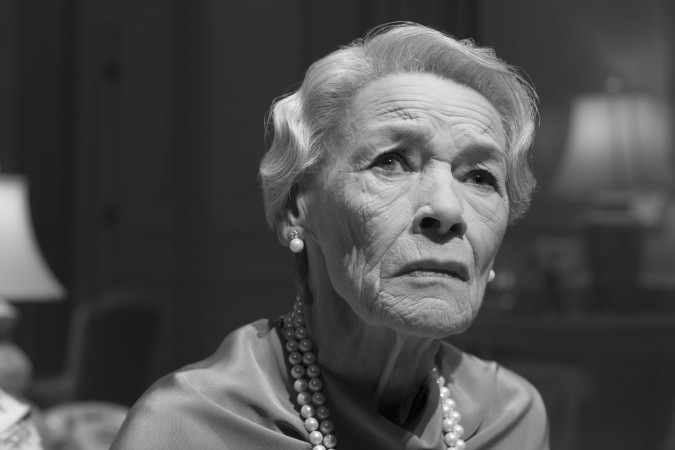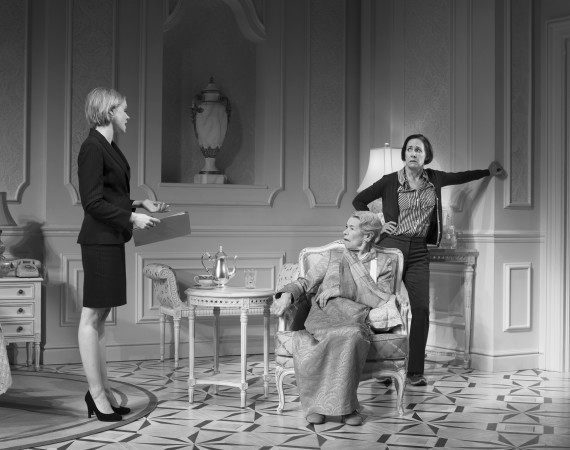Review: Retired From Parliament, Glenda Jackson Returns to Broadway in Edward Albee's THREE TALL WOMEN
It's been nearly three decades since the superb stage artist Glenda Jackson took her last opening night bow on Broadway, playing Lady Macbeth in 1988. Since then she's been working in the somewhat less scripted field of British politics, serving in Parliament for over twenty years.

Luring her back into town is a role quite worthy of her brand of intelligence and grandeur in Edward Albee's 1994 Pulitzer winner, Three Tall Women, presented in one of those pitch-perfect productions audiences have habitually come to expect from director Joe Mantello.
After a premiere production in Vienna, the success of the original Off-Broadway mounting of Three Tall Women represented a great comeback for Albee, whose three Broadway plays during the 1980s were all poorly received by the press and closed quickly.
It also represented an emotional release for the playwright, modeling the estranged relationship between the central character and her son with his own relationship with an adoptive mother who resented his being gay.
Jackson is part of an exceptional trio that shares the stage for nearly all of the two-scene intermissionless piece. She's joined by last season's Best Actress in a Play Tony winner Laurie Metcalf, whose stage career seems to be pointed to eventually achieve her co-star's exalted status, and Alison Pill, a former Tony nominee herself.
The pastels and lace setting provided by designer Miriam Buether is a luxurious bedroom occupied by characters the author designates as simply A, B and C. We're at the home of Jackson's character, an arguably 91-year-old widow who carries herself as regally as her deteriorating body will allow, despite brittle bones and failing control of bodily functions.
Metcalf is her acerbic caregiver, who is too familiar with her employer's needs and idiosyncrasies to show any signs of exasperation. Pill is the crisply groomed, curtly mannered representative of Jackson's lawyer, trying to make sense of the lady's finances before the inevitable.
The first scene has the caretaker going through the paces of tending to her client, adjusting the pillow just right in the comfy chair and trying to keep bathroom visits uneventful. Her explanation of the procedures to Pill naturally informs the audience as well.
When the young woman expresses sympathy for the elderly woman's loss of dignity, Metcalf offers her blunt view of life.
"Oh, stop it," she snaps. "It's downhill from sixteen on! For all of us!"

Laurie Metcalf (Photo: Brigitte Lacombe)
In the view of this woman who makes her living focused on people with little time left, the acceptance of death and of old age's indignities should be second nature.
"I'd like to see children learn it," she explains. "Have a six-year-old say, 'I'm dying' and know what it means."
With wry humor and some casual racism, the older woman unsentimentally (this is Albee) summons up fading memories of a privileged life, a troubled marriage and an estranged relationship with her son.
But what turns out to be the woman's swan sing in real life isn't so in the playwright's often surrealistic world. The circumstances of the first scene take us to a second half where the older woman is healthy, sharp-minded and happy to be at "the point where you can think about yourself in the third person without being crazy."
Pill is now Jackson's character in her 20s, plotting out the fabulous life ahead of her. Metcalf is the woman's middle-aged version, hardened by how it all turned out and not yet able to enjoy the luxury of emotional detachment that comes with the knowledge that it will all be over soon enough.
In a sense, Three Tall Women is about as close as Edward Albee came to writing a feel-good play, considering that death is life's way of saving the best for last.
As the elderly woman describes the perspective that her years have brought to her, "There's a difference between knowing you're going to die and knowing you're going to die."
Reader Reviews



